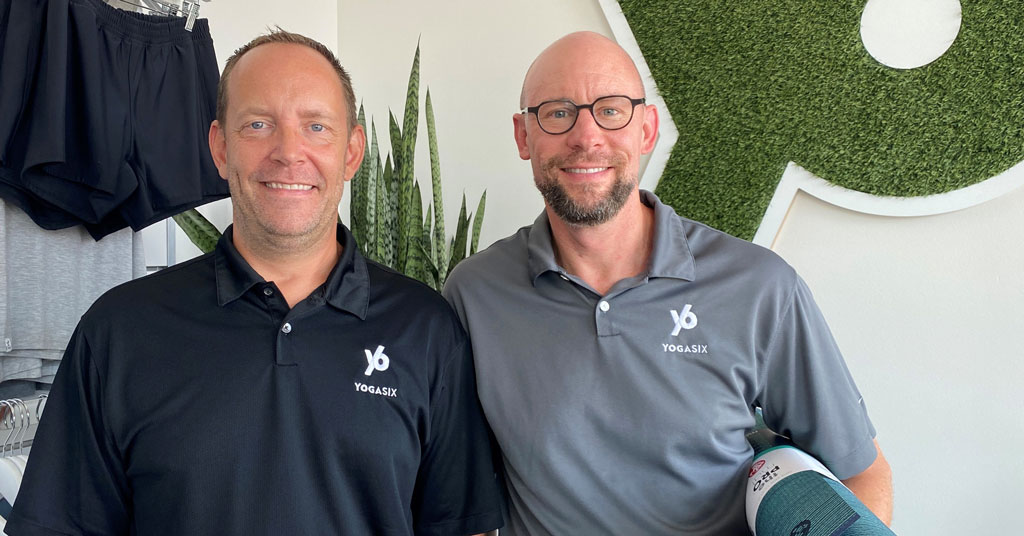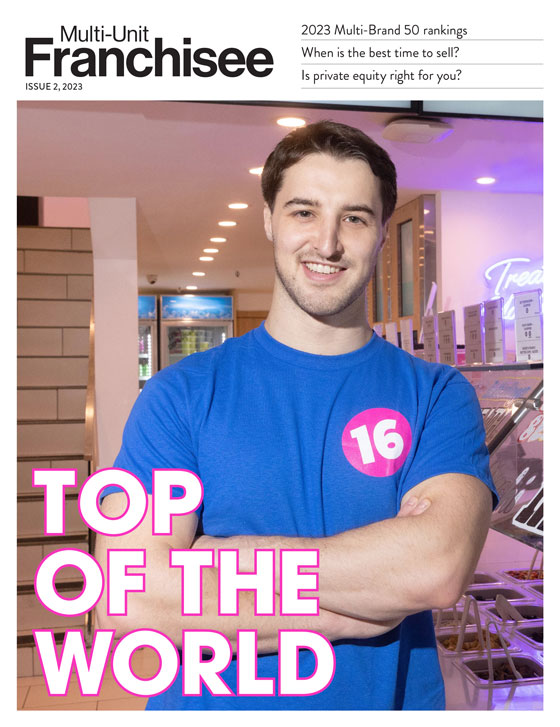Power Couple: Keeping Palm Springs fit is a full-time job

Name: Chris Dordell
Company: Coachella Fitness Concepts
Title: Co-Owner
No. of units: 2 Club Pilates, 2 YogaSix, 1 CycleBar
Age: 52
Family: Husband and co-owner Jason Fenske
Years in franchising: 5
Years in current position: 5
Name: Jason Fenske
Title: Co-Owner
Company: Coachella Fitness Concepts
No. of units: 2 Club Pilates, 2 YogaSix, and 1 CycleBar
Age: 50
Family: Husband and co-owner Chris Dordell
Years in franchising: 5
Years in current position: 2
Chris Dordell and Jason Fenske have been together for nearly a quarter century and had long planned to build a co-owned franchise group together. While that took longer than planned, they are now happily building a group of fitness franchise locations in Palm Springs, California—and working at it more than full-time.
“We talk about business 24/7 and work constantly, but we hope to get to a point where we have more downtime than we do now,” says Dordell. Although they’ve defined a division of labor for themselves—Dordell is the CFO and CMO and Fenske manages the HR team for the 60 employees at five locations, the retail experience at all the locations, and the indoor cycling unit—employees who see them just assume they are interchangeable. “So we both have to know everything,” he says.
Dordell and Fenske spent the majority of their pre-franchising business lives working in corporate jobs. Dordell left first, did some investigation, and then received a solicitation email about a franchising opportunity. Club Pilates struck him as a relatively simple business model that didn’t require hundreds of employees and, says Dordell, “We liked the fitness aspect of it.” A year after their first club opened, they expanded into the space next door with a CycleBar franchise.
The duo say they are happy with their Palm Springs territory and don’t want to go too far or expand a lot more. “I feel like the business will be much more successful when you are on the ground as an involved owner,” says Dordell.
PERSONAL
First job: Dordell: Shoe department and cashier at Marshall’s. Fenske: Soda jerk at a malt shop.
Formative influences/events: Dordell: My father, who was a managing partner in a law firm, my older brother, who has always given solid advice. Also, working at an advertising agency taught me to be agile and a great multi-tasker. Fenske: My grandfather always told me that taking care of your people was number one, and, if you did that, they’d take care of you and your business.
Key accomplishments: Dordell: My 25 years in corporate and agency marketing. My last job was head of international marketing at Wells Fargo Bank. Fenske: At Salesforce, I Introduced a career development program to cultivate managers’ and team members’ success. Ultimately, it boosted employee satisfaction by simplifying promotion criteria and improved overall team wellness scores.
Biggest current challenge: Fenske: Recruiting and retaining employees is always a challenge, especially in a smaller geographic area. The competition for good candidates is strong and the number of candidates small.
Next big goal: Dordell: Achieve solid, sustained profitability for all the studios. Fenske: I am training to be a Pilates teacher at our Club Pilates.
First turning point in your career: Dordell: Moving from agency to “in-house” marketing, then climbed the corporate ladder.
Best business decision: Dordell: Deciding to leave corporate America and dive into franchising and business ownership. Fenske: Enrolling in the Integral Coach training program at New Ventures West was pivotal for my personal and professional growth. I’ve had a small private practice as a coach and have been able to use all those skills in every aspect of my life since I graduated in 2014.
Hardest lesson learned: Dordell: Have your ducks in a row as it relates to following state employment laws. In a small business you may think of your team as a family, but always do things by the book. Otherwise things may go south and turn ugly. Fenske: The shift from a corporate job to franchising meant learning how to slow down in order to get more done and to relate to a different kind of employee.
Work week: Dordell: We work pretty much every day, but have some flexibility in our schedules. It’s never 8 to 5 only. We are always taking care of something. Fenske: When you own a small business, the business is always on your mind, so it’s important to find time for ourselves.
Exercise/workout: Dordell: You would think owning five fitness studios we would do more exercise. Unfortunately it’s as difficult for us to find the time as it is for our customers. Of our three brands, I enjoy the Pilates workout the most and I’ve started to take more cycling classes. Fenske: Pilates is my true love, so I try to get into a class two or three times a week or get a private session. I also throw in a few yoga and indoor cycling classes here and there.
Best advice you ever got: Fenske: Be curious and cultivate curiosity as a skill. This leads to more listening, better problem solving, and a lot more fun.
What’s your passion in business? Dordell: We formed our business to help people feel good in their bodies. We love hearing the stories of our how our businesses are making a difference in people’s lives. Fenske: Seeing someone leave a class and say that they feel amazing is the best gift I get every single day! Also, I like to create an environment where our team can thrive.
How do you balance life and work? Dordell: Right now, very poorly. We are always working on the businesses, at home on the laptop and during the day at the studios helping our team. Living in Palm Springs, we do get to enjoy the outdoors most of the time and the weather is great!
Guilty pleasure: Dordell: Chocolate-covered almonds and wine. Fenske: Gummy bears and gin.
Favorite book: Dordell: I am not sure I have one favorite. I like historical and political novels and I like fiction mysteries. Fenske: From a business perspective, I love by Patrick Lencioni. On a personal note, I am a huge fan of by Richard Bach.
Favorite movie: Dordell: “Broadcast News.” Fenske: It’s a tie between “The Wizard of Oz” and “Grease.”
What do most people not know about you? Dordell: I’m a pretty private person, I don’t share a lot. I do have a small talent to do impersonations that most people do not know about. Fenske: I’m generally an open book, but people may not know that I would love to have a private pottery studio where I could throw pots as a creative outlet.
Pet peeve: Dordell: Lack of a solid work ethic. People not using common sense to solve a problem. Fenske: I’ve always been a “pile person,” but I know where everything is in my piles. That is, until someone moves my piles.
What did you want to be when you grew up? Dordell: When I was very young, a pilot. Then I switched in high school to an interest in journalism. I wanted to be a network news anchor. Fenske: A chef.
Last vacation: Portugal and Spain last summer.
Person I’d most like to have lunch with: Dordell: I love presidential history and have a goal to visit all the presidential libraries. Probably President Obama. Fenske: Derek DelGaudio, the creator of “In and Of Itself” that was on Broadway and is now a documentary on Hulu.

MANAGEMENT
Business philosophy: Dordell: Do your best to provide a welcoming environment for employees and customers, but one that is also ethical and common sense. This will keep people coming back. Fenske: 1) Do something you love. 2) Work with people you genuinely like and care about. 3) Listen more than you speak. 4) Avoid drama by taking responsibility and speaking clearly.
Management method or style: Dordell: I would say I am hands-on, but I try as much as I can to teach people to do a task, rather than do it myself. Also, giving people grace and knowing that they probably don’t know as much as I do at times, or have different areas of expertise than I do. I’m always willing to listen to all ideas and then make a decision. Fenske: I think about management from a perspective of experiences. What is the experience I want my team to have, and what is the experience I want them to deliver for my customers? Then ask for feedback and be curious about what I hear so I can make change for the better. When I meet with my team I always try to have a good mix of inspiration, information, and participation.
Greatest challenge: Dordell: People are the greatest challenge. Hiring, training, and retaining people. Fenske: I always have a lot of creative ideas brewing in my head that can lead to “shiny object syndrome.”
How do others describe you? Dordell: I would say fair, practical, common-sense, even-keeled with a dry sense of humor. Fenske: Passionate, caring, smart, driven, curious, and fair.
One thing I’m looking to do better: Dordell: Train my managers and team to delegate and let go of more. Fenske: I’d love to find more ways to have an impact in the broader community as a business owner and business leader.
How I give my team room to innovate and experiment: Dordell: I try to check in regularly and ask questions that might spur new ideas. And setting boundaries so they know where the lines are. Fenske: I try to be a debate-maker, meaning that any suggestion is welcome and worthy of a conversation.
How close are you to operations? Dordell: Very close. I am able to step in and manage any of our businesses on a day-to-day basis should someone get sick or leave. Fenske: Very close! I’m in one or more of our studios almost every day.
What are the two most important things you rely on from your franchisor? Dordell: Best practices/tips from other franchisees and national brand support to help brand recognition. Fenske: We need best practices that evolve as we learn more and marketing/branding support.
What I need from vendors: Dordell: Show the value of the service you provide. How have you helped other business owners? Understand our challenges. Fenske: High-quality products and great customer service/communication.
Have you changed your marketing strategy in response to the economy? How? Dordell: We follow our franchisors’ marketing strategy, which is a combination of digital advertising and community events. As for brand positioning, we need to demonstrate the value of what we provide and why someone should invest in their own health. Fenske: It’s all about connecting through social media, making people feel something that drives them to get in touch.
How is social media affecting your business? Dordell: As with anything, the biggest challenge is anyone can post anything online, whether it is true or not, or just comment on ads and be negative. On the plus side, it does help people learn about our brands and offering. It’s a must to be on there and posting regularly. Fenske: Our advertising is almost exclusively on social media platforms, and the best advertising is when someone posts about their experience for their friends.
How do you hire and fire? Dordell: It’s so difficult to find solid part-time employees who really have a passion for fitness and aren’t just looking for a job. We do the best we can with training, but if someone is not the right fit we try to take action as soon as possible, following the right legal steps. Fenske: We use standard questions for all interviews to make sure all candidates are treated equally. We have a simple process for hiring: phone screen, audition (for teachers), and in-person (panel) interview. When it comes to letting someone go, we try to take action as soon as possible if we determine that someone isn’t the right fit for the role.
How do you train and retain? Dordell: We do lots of shadowing of managers and other employees in each studio. We also rely on training modules provided by the franchisors. Fenske: For our front desk teams, we have an onboarding process to make sure they know all the core components of their job. And we do a lot of role playing, not just when hired, but all throughout an employee’s time with us. For teachers, we have a more robust training to ensure that they are following our corporate standards and methodologies. Each brand has a “Bridge Training” that takes their knowledge and experience and helps them learn to shape it so it meets our expectations.
How do you deal with problem employees? Dordell: Give them verbal feedback, then proceed to verbal and written warnings, if necessary. In some cases, if an instructor or operations staff person is a liability to the business we have taken action to terminate them. Fenske: Be honest, offer regular feedback, and set actionable goals with appropriate support. If that doesn’t work out, it’s better to part ways than to continue down the wrong path.
Fastest way into my doghouse: Dordell: Not being responsible with business resources, or just not caring. Fenske: Withholding information or outright lying will land you in the doghouse.
COVID-19
How did Covid-19 affect your business? Dordell: One of the Pilates studios was shut down for 10 months. The other was opened at half capacity. We opened the first YogaSix in July 2020, the height of the shutdown. It felt like it was a constant scramble and pivot.
How have you responded? Dordell: We were able to get government funds through PPP and the Employee Retention Tax Credit. One major change in the yoga studio is people no longer feel like they can be eight inches apart, which was standard in most studios.
What changes do you think will be permanent? Dordell: Providing a little more distance between mats in the yoga room. Sharing more about our cleaning procedures.
BOTTOM LINE
(Note: All responses are Dordell’s.)
Annual revenue: $3.2 million expected this year (approx.).
2023 goals: Solid profitability for each studio, getting the CycleBar on track for repeatable monthly performance, and hiring some additional shared staff we can delegate more to.
Growth meter: How do you measure your growth? Monthly membership numbers and revenue numbers.
Vision meter: Where do you want to be in 5 years? 10 years? In 5 years, I’d like to be working less and have strong managers running the business with our direction. In 10 years, hopefully a sale/exit and heading into retirement.
Do you have brands in different segments? Why/why not? We have stayed in fitness but with the same franchisor (XPonential).
How is the economy in your region affecting you, your employees, your customers? More people are moving into the area. The home market was very hot in 2022, but is slowing. There is still lots of growth, and the area demographics are getting younger. We are competing for part-time employees with lots of spas, country clubs, and hotels.
Are you experiencing economic growth in your market? Yes, although it’s very focused here on retail, service, healthcare, and hospitality. We don’t have a lot of other industries.
How do changes in the economy affect the way you do business? We tend to have slower summers. Seasonal visitors leave, so we adjust number of classes and number of hours for our operations team when there are fewer active members.
How do you forecast for your business? We review numbers weekly and monthly, forecasting membership and revenue.
What are the best sources for capital expansion? The SBA loans from Covid were very helpful. We self-funded the initial two studios and we partnered with a small community bank on a loan for the first YogaSix studio.
Experience with private equity, local banks, national banks, other institutions? Why/why not? Local bank. We did partner with one, and that was a pretty smooth process. Some of the smaller banks at the time were sitting on a lot of cash and looking for places to invest.
What are you doing to take care of your employees? From a healthcare perspective, we don’t offer health benefits. For our full-time managers, we offer a monthly expense reimbursement if they purchase their own health insurance plan. We do offer a 401(k) plan after a year and offer matching funds for that.
How are you handling rising employee costs (payroll, minimum wage, healthcare, etc.)? It’s a challenge! Competition for workers is tough, so we end up offering more per hour to make it attractive. And it’s very easy for them to find another job that pays a little more.
What laws and regulations are affecting your business and how are you dealing with them? State employment laws around timekeeping are always a challenge to keep up with. We have an employment law firm on a monthly retainer, and they answer any questions and give us advice. They also put on seminars and tell us what we need to be concerned about.
How do you reward/recognize top-performing employees? Discretionary bonuses. Our managers have bonus targets for revenue.
What kind of exit strategy do you have in place? We don’t have a full strategy in place yet, other than we assume we will want to sell the company within 8 to 10 years.

Share this Feature
Recommended Reading:
FRANCHISE TOPICS
- Multi-Unit Franchising
- Get Started in Franchising
- Franchise Growth
- Franchise Operations
- Open New Units
- Franchise Leadership
- Franchise Marketing
- Technology
- Franchise Law
- Franchise Awards
- Franchise Rankings
- Franchise Trends
- Franchise Development
- Featured Franchise Stories
FEATURED IN

Multi-Unit Franchisee Magazine: Issue 2, 2023

$350,000
$50,000





 The multi-unit franchise opportunities listed above are not related to or endorsed by Multi-Unit Franchisee or Franchise Update Media Group. We are not engaged in, supporting, or endorsing any specific franchise, business opportunity, company or individual. No statement in this site is to be construed as a recommendation. We encourage prospective franchise buyers to perform extensive due diligence when considering a franchise opportunity.
The multi-unit franchise opportunities listed above are not related to or endorsed by Multi-Unit Franchisee or Franchise Update Media Group. We are not engaged in, supporting, or endorsing any specific franchise, business opportunity, company or individual. No statement in this site is to be construed as a recommendation. We encourage prospective franchise buyers to perform extensive due diligence when considering a franchise opportunity.